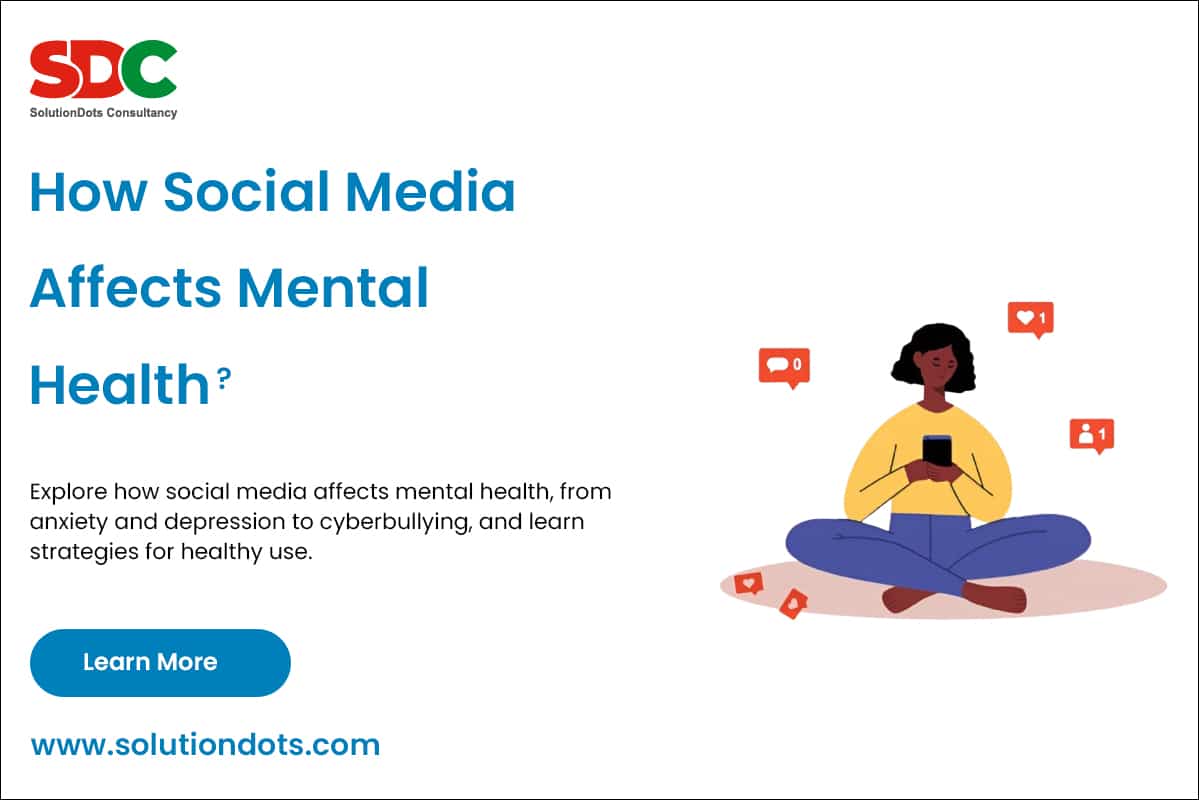How Social Media Affects Mental Health
- Digital Marketing February 20,2025

Social media has become an integral part of our daily lives, offering a platform to connect with friends, share experiences, and stay updated on current events. However, its impact on mental health is a topic that has sparked increasing concern. While social media can offer many benefits, it also presents risks that can harm our mental well-being. In this blog post, we will explore both the positive and negative ways how social media affects mental health and what you can do to protect yourself.
1. The Pressure of Comparison
One of the most significant negative impacts of social media is the pressure it creates for users to compare themselves to others. Platforms like Instagram, Facebook, and TikTok often showcase curated versions of people’s lives highlighting their achievements, vacations, and moments of success. For many, this leads to feelings of inadequacy or self-doubt, especially when comparing their real lives to the seemingly perfect lives of others.
Constantly scrolling through images of other people’s accomplishments can contribute to low self-esteem and anxiety, as individuals may feel they are falling short in comparison. It’s important to remember that what is shared on social media is typically only a highlight reel, not an accurate representation of reality.
2. Social Media and Anxiety
Social media can contribute to feelings of anxiety, especially in today’s fast-paced, always-connected world. Notifications, messages, and constant updates can make people feel overwhelmed and pressured to stay engaged. The fear of missing out (FOMO) is a common experience, where users feel anxious about not being up-to-date with trends, news, or social events.
Moreover, engaging in online discussions or receiving negative comments can lead to heightened anxiety. The pressure to present a perfect online persona or conform to societal expectations can be stressful, particularly for young people who are still developing their self-image.
3. Cyberbullying and Its Emotional Toll
Cyberbullying is a pervasive issue on social media platforms, and it can have a devastating effect on mental health. Harassment, trolling, and hurtful comments are unfortunately common, especially for those in the public eye or those with a large following. Victims of cyberbullying may experience depression, anxiety, and feelings of isolation, and in extreme cases, the emotional toll can lead to suicidal thoughts.
Unlike traditional bullying, cyberbullying can occur 24/7, making it harder for victims to escape the harassment. The anonymity of online interactions can embolden individuals to say things they would never say face-to-face, further escalating the impact of bullying.
4. Social Media and Depression
Studies have shown a link between heavy social media use and an increased risk of depression. Constant exposure to distressing news, negative content, or even the pressure of online interactions can lead to feelings of sadness and hopelessness. For some individuals, the more time spent on social media, the more disconnected they feel from their real-life relationships.
Additionally, the addiction-like nature of social media can exacerbate symptoms of depression. Spending excessive hours on platforms can reduce time spent in offline activities that promote well-being, such as exercising, sleeping, or connecting with loved ones.
5. The Impact of Social Media on Sleep
Another way social media affects mental health is by interfering with sleep patterns. Many people engage in social media use late into the night, which can disrupt the body’s natural sleep cycle. The blue light emitted from screens can also hinder the production of melatonin, the hormone responsible for regulating sleep, leading to poor sleep quality.
Lack of sleep is linked to various mental health issues, including irritability, stress, and difficulty concentrating. In the long run, chronic sleep deprivation can increase the risk of developing more serious mental health conditions like depression and anxiety.
6. Social Media and Positive Connections
Despite the negative aspects, social media also offers opportunities for positive impact on mental health. It can provide a sense of community for people who feel isolated or marginalized. Social media allows individuals to connect with others who share similar interests, experiences, or challenges, offering a supportive environment where they can exchange advice and offer encouragement.
For example, online support groups for mental health issues can create a space for individuals to share their struggles, ask for help, and receive positive reinforcement from others. Social media can also be used for educational purposes, raising awareness about mental health issues and promoting well-being through mental health campaigns.
7. Setting Boundaries for Healthy Social Media Use
While social media can have its downsides, there are steps you can take to reduce its negative impact on your mental health:
- Limit Screen Time: Set boundaries for how much time you spend on social media each day. Try to avoid using social media right before bed to ensure you get adequate sleep.
- Unfollow Negative Content: Curate your social media feed by unfollowing accounts or pages that make you feel negative or anxious. Follow accounts that promote positivity, mental health awareness, or personal growth.
- Practice Digital Detoxes: Take regular breaks from social media to recharge and reconnect with yourself and the world around you.
- Be Mindful of Comparisons: Remind yourself that social media often highlights the best moments of others’ lives, and it doesn’t reflect the full picture. Focus on your own journey and celebrate your achievements.
- Engage in Meaningful Interactions: Use social media to build positive connections, whether by supporting friends, sharing inspiring content, or participating in online communities that promote mental wellness.
Read More About: The Power of Social Media Marketing: Benefits You Need to Know
Conclusion
Social media is a double-edged sword it has the potential to connect and empower, but it can also negatively affect mental health if used excessively or mindlessly. By being mindful of how social media impacts your emotions and mental state, you can create a healthier balance and enjoy the benefits of social media without falling victim to its harmful effects. Remember, it’s important to prioritize your mental health and take active steps to protect it in the digital age.









 Saudi Arabia (English)
Saudi Arabia (English) United Kingdom
United Kingdom Global Site
Global Site